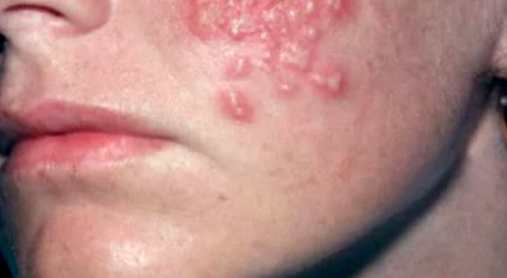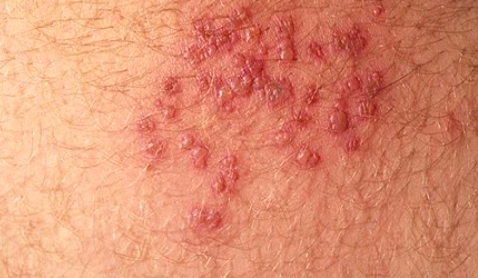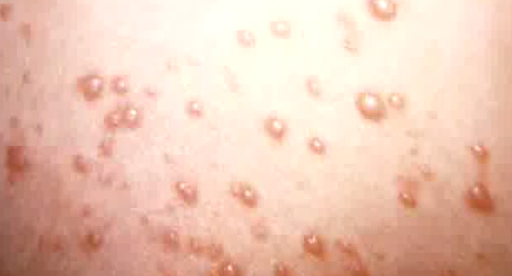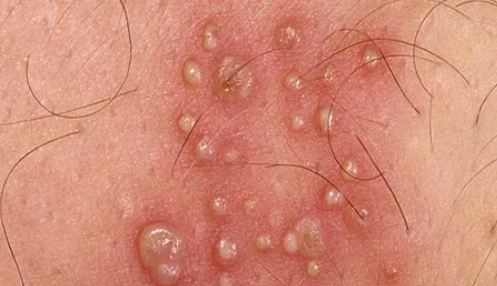HIV Rash
HIV is abbreviation of Human Immunodeficiency Virus which is a preceding condition of AIDS or Acquired Immunodeficiency Syndrome. This is a life threatening physical condition which destroys significant cells of the body. The condition causes several symptoms. One of the common symptoms of the condition is HIV rash. This is a kind of rash on the skin which is commonly recorded in HIV patients. It is studied that around 80% of the HIV sufferers experience HIV rash symptoms. The rashes are often reddish in color and can be extremely itchy in nature. Appearance of these rashes may differ according to the severity of the disease. In most cases, raised small bumps are also observed.
There is no concrete description of HIV rashes in the medical records. But HIV rashes can be divided into four classes which are as follows:
There are antiretroviral medications that are known to cause skin rashes as side effects in some situations. These drugs are suggested as treatment for HIV infection and its associated symptoms. Some of such antiretroviral medicines include nevirapine, abacavir and amprenavir. These are few of the drugs that can lead to HIV rash. Ceasing the use of these medicines may possible ebb away rashes, but one should do this only after consulting your doctor.
These are acute rashes which occur due to HIV infection. These rashes are noticed within few days from the time of affliction of the infection. There are other symptoms as well which are recorded along with these rashes. Chest, back, palms, etc, are the common regions for these rashes to occur; nevertheless, they can be seen on any part of the body. These kinds of rashes are often difficult to be diagnosed and may need thorough investigation through several tests.
The third phase of HIV infection may causes dermatitis which in turn leads to symptoms such as skin anomalies. These sort of rashes are usually pinkish or reddish in appearance as well as they may be itchy at times. These may last for 1 to 3 years according to records and estimation. Some of the common body regions where these symptomatic rashes can be found are groin, underarms, torso, facial skin and back.
HIV sufferer may also have herpes and such individuals are prone to skin problems. If HIV is also accompanied by herpes then it becomes difficult for the patient to handle the condition. HIV and Herpes are STDs or Sexually Transmitted Disease. This makes the mortality rate extremely high. There are other symptoms of herpes which may be experienced along with these rashes. In such a situation the rashes are often filled with fluid. After few days these bumps bursts and spread further. The condition is very serious and if not controlled earlier, it may also lead to death.
Causes
HIV rashes mostly occur in people suffering from HIV infection. The HIV virus is a dreadful virus which can affect the tissues in the vaginal and anal lining. The virus can also affect mouth or eyes. There are three stages through which the infection progresses gradually. Occurrence of painful rashes as well as other flu-like symptoms indicates the primary stage of infection. The dermatologic symptoms may take place during seroconversion when noticeable antibodies are generated in oppose to infectious agents present in blood.
In some situations some antiretroviral drugs as mentioned above can also trigger allergic reaction or side effects causing rashes to appear. The Human Immunodeficiency Virus can severely influence and deteriorate the immune system causing the body to lose its ability to fight minor and major invaders of the body and infection. This also contributes to cause rashes on the skin.
Chorionic skin rashes are often related with several skin issues which are usually difficult to diagnose through conventional physical screenings. In order to rule out HIV as underlying cause of rashes there are two routine tests suggested to the patient. The first test is specific to count of CD4 cells. People who are infected with the condition often have low CD4 count. The second test suggested is determining the amount of viral load in blood. Infected individual with high viral load are susceptible to reduced CD4 cells and faster progression of the condition as compared to those with low viral load. The efficacy of new treatments and medications can be evaluated by understanding the count of virus in blood.
HIV rashes has some features which makes it possible to recognized them; here are some aspects of HIV rashes
Other symptoms that may occur along with these rashes can hint that the skin condition is due to HIV.
Treatment
HIV rash often resolves in around 2 weeks. However they may become dormant or asymptomatic. There is no confirmed cure for HIV infection but there are some hypotheses which can be a potential treatment in future. The treatment of HIV rash would depend on the cause of the condition. If it occurs due to medicinal side effects then ceasing the use of the medicine can help. There are some non prescription medicines such as hydrocortisone cream which may alleviate the itchiness. Best treatment to deal with HIV rash can be recommended by your doctor alone. HIV is a serious health condition and adopting any measure to deal with it or its symptoms should be done only after approved by your doctor.





HIV is abbreviation of Human Immunodeficiency Virus which is a preceding condition of AIDS or Acquired Immunodeficiency Syndrome. This is a life threatening physical condition which destroys significant cells of the body. The condition causes several symptoms. One of the common symptoms of the condition is HIV rash. This is a kind of rash on the skin which is commonly recorded in HIV patients. It is studied that around 80% of the HIV sufferers experience HIV rash symptoms. The rashes are often reddish in color and can be extremely itchy in nature. Appearance of these rashes may differ according to the severity of the disease. In most cases, raised small bumps are also observed.
HIV Rash Types
There is no concrete description of HIV rashes in the medical records. But HIV rashes can be divided into four classes which are as follows:
HIV rashes due to medicinal reaction:
There are antiretroviral medications that are known to cause skin rashes as side effects in some situations. These drugs are suggested as treatment for HIV infection and its associated symptoms. Some of such antiretroviral medicines include nevirapine, abacavir and amprenavir. These are few of the drugs that can lead to HIV rash. Ceasing the use of these medicines may possible ebb away rashes, but one should do this only after consulting your doctor.
HIV Rash of Acute nature
These are acute rashes which occur due to HIV infection. These rashes are noticed within few days from the time of affliction of the infection. There are other symptoms as well which are recorded along with these rashes. Chest, back, palms, etc, are the common regions for these rashes to occur; nevertheless, they can be seen on any part of the body. These kinds of rashes are often difficult to be diagnosed and may need thorough investigation through several tests.
Symptomatic HIV Rashes
The third phase of HIV infection may causes dermatitis which in turn leads to symptoms such as skin anomalies. These sort of rashes are usually pinkish or reddish in appearance as well as they may be itchy at times. These may last for 1 to 3 years according to records and estimation. Some of the common body regions where these symptomatic rashes can be found are groin, underarms, torso, facial skin and back.
HIV rashes due to Herpes
HIV sufferer may also have herpes and such individuals are prone to skin problems. If HIV is also accompanied by herpes then it becomes difficult for the patient to handle the condition. HIV and Herpes are STDs or Sexually Transmitted Disease. This makes the mortality rate extremely high. There are other symptoms of herpes which may be experienced along with these rashes. In such a situation the rashes are often filled with fluid. After few days these bumps bursts and spread further. The condition is very serious and if not controlled earlier, it may also lead to death.
Causes
HIV rashes mostly occur in people suffering from HIV infection. The HIV virus is a dreadful virus which can affect the tissues in the vaginal and anal lining. The virus can also affect mouth or eyes. There are three stages through which the infection progresses gradually. Occurrence of painful rashes as well as other flu-like symptoms indicates the primary stage of infection. The dermatologic symptoms may take place during seroconversion when noticeable antibodies are generated in oppose to infectious agents present in blood.
In some situations some antiretroviral drugs as mentioned above can also trigger allergic reaction or side effects causing rashes to appear. The Human Immunodeficiency Virus can severely influence and deteriorate the immune system causing the body to lose its ability to fight minor and major invaders of the body and infection. This also contributes to cause rashes on the skin.
Diagnosis
Chorionic skin rashes are often related with several skin issues which are usually difficult to diagnose through conventional physical screenings. In order to rule out HIV as underlying cause of rashes there are two routine tests suggested to the patient. The first test is specific to count of CD4 cells. People who are infected with the condition often have low CD4 count. The second test suggested is determining the amount of viral load in blood. Infected individual with high viral load are susceptible to reduced CD4 cells and faster progression of the condition as compared to those with low viral load. The efficacy of new treatments and medications can be evaluated by understanding the count of virus in blood.
Symptoms
HIV rashes has some features which makes it possible to recognized them; here are some aspects of HIV rashes
- The patient suffering from the condition develops brown or else reddish lumps such as pimples. These appear similar to eczema and are in clusters
- HIV infection may also lead to lesions due to skin peeling
- In some cases HIV rashes can be itchy
- HIV rashes can occur in almost any region of the body. In seldom cases even genitals, eyes as well as mouth is also infected
- These HIV rashes may persist for up to 2 weeks but they are not transmissible
Other symptoms that may occur along with these rashes can hint that the skin condition is due to HIV.
- Memory loss
- Loose motions
- Unexpected unknown fever
- Pain in muscle
- Body ache and cramps
- Gland enlargement
- Blurred vision
- Lose of appetite and reduction in weight
- Pain in joints
Treatment
HIV rash often resolves in around 2 weeks. However they may become dormant or asymptomatic. There is no confirmed cure for HIV infection but there are some hypotheses which can be a potential treatment in future. The treatment of HIV rash would depend on the cause of the condition. If it occurs due to medicinal side effects then ceasing the use of the medicine can help. There are some non prescription medicines such as hydrocortisone cream which may alleviate the itchiness. Best treatment to deal with HIV rash can be recommended by your doctor alone. HIV is a serious health condition and adopting any measure to deal with it or its symptoms should be done only after approved by your doctor.
HIV Rash Pictures





No comments:
Post a Comment